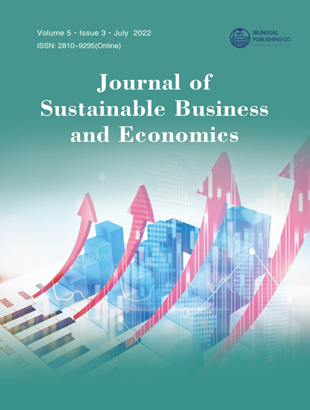-
227
-
187
-
144
-
138
-
134
Commercial Banks Responses toward Small and Medium Enterprises Survival in the Context of the COVID-19 in Africa
DOI:
https://doi.org/10.30564/jsbe.v5i3.15Abstract
The African government has implemented measures to sustain an investable economic downturn as it navigates the fiscal effect of the viral spread of coronavirus disease 2019 (COVID-19). Consequently, commercial banks in Africa have come hand in hand toward support of SMEs activities by increasing their borrowing power and reducing interest rates. Despite all these measures the general performance of small and medium enterprises (SMEs) across Africa as pertains to revenues and profits has gone down. This paper provides a theoretical analysis of the measures undertaken by commercial banks to ensure proper running and continuity of activities in the SMEs sector in Africa. The research is founded on the theories of innovation diffusion and resource-based theory. This study will use a mixed research design, which will include descriptive and explanatory research. The proposed target population will be Africa’s thriving commercial banks. The primary and secondary data will be used from commercial bank reports and the central bureau of statistics reports across Africa. The data will be analyzed using a multiple linear regression model. The finding indicated that commercial banks in Africa have brought in solutions and measures to adapt to the crisis being implicated on the SMEs by the COVID-19 pandemic. Based on the findings of the desktop reviews, the study concludes that commercial banks have a significant influence on SMEs during this period of COVID-19, and with the assistance of the government, they have implemented more policies to support the activities of SMEs.
Keywords:
Africa; COVID -19; Commercial banks; Small and medium enterprisesReferences
[1] Arthur, S., Caleb, T., Abanis, T., et al., 2021. Anal-ysis of the effects of COVID 19 on the operations and sustainability of SMEs in South Western region, Uganda. African Journal of Business Management. 15(7), 174-183. DOI: https://doi.org/10.5897/ajbm2020.9110
[2] Shafi, M., Liu, J., Ren, W., 2020. Impact of COVID-19 pandemic on micro, small, and medi-um-sized Enterprises operating in Pakistan. Research in Globalization. 2. DOI: https://doi.org/10.1016/j.resglo.2020.100018
[3] Yap, M.H.T., Chen, N., 2017. Understanding young Chinese wine consumers through innovation diffu-sion theory. Tourism and Hospitality Management. 23(1), 51-68. DOI: https://doi.org/10.20867/thm.23.1.3
[4] Muathe, S.M., Ofafa, G., Wawire, N.H.W., 2013. An empirical study on the relationship between organiza-tional factors and adoption of ICT among health re-lated SMEs in Nairobi, Kenya. International Journal of Arts and Commerce. 2(3), 1-16. http://www.ku.ac.ke/schools/business/images/stories/research/health_ict.pdf.
[5] Ogola, M.G.O., Sikalieh, D., Linge, T.K., 2017. The Influence of Intellectual Stimulation Leadership Behaviour on Employee Performance in SMEs in Kenya. International Journal of Business and Social Science. 8(3), 89-100. https://ijbssnet.com/journals/Vol_8_No_3_March_2017/9.pdf.
[6] Anderson, R.M., Heesterbeek, H., Klinkenberg, D., et al., 2020. How will country-based mitigation mea-sures influence the course of the COVID-19 epidemic? The Lancet. 395(10228), 931-934. DOI: https://doi.org/10.1016/S0140-6736(20)30567-5
[7] Rwigema, P.C., 2020. Effect of COVID-19 on Micro, Small and Medium Enterprises (MSMEs) In Rwan-da. The Strategic Journal of Business & Change Management. 7(4), 1630-1655.
[8] Suleri, A., Shabbir, M., 2020. Sustainable Develop-ment Policy Institute. QPolicy. 2013(2012), 2012.
[9] McGeever, N., McQuinn, J., Myers, S., 2020. SME liquidity needs during the COVID-19 shock. https://ec.europa.eu/growth/smes/business-friendly-environ-ment/sme-definition_en.
[10] Gok, 2020. The fourth presidential address on the coronavirus pandemic thursday.
[11] Gakii, A., Maina, S., 2019. Nexus Between Online Marketing Strategies and Market Performance: A Critical Review of the Literature and Research Agen-da. European Journal of Business and Management. DOI: https://doi.org/10.7176/ejbm/11-15-12
[12] Bazarbash, M., Beaton, K., 2020. Filling the Gap: Digital Credit and Financial Inclusion. IMF Working Papers. DOI: https://doi.org/10.5089/9781513552477.001
[13] Mohammad, H., Shahnawaz, K., Mustafa, R.R., et al., 2020. An Artificial Intelligence and NLP based Islamic FinTech Model Combining Zakat and Qardh-Al-Hasan for Countering the Adverse Impact of COVID 19 on SMEs and Individuals. International Journal of Economics and Business Administration. VIII(2), 351-364. DOI: https://doi.org/10.35808/ijeba/466
[14] Bartik, A., Bertrand, M., Cullen, Z., et al., 2020. How are Small Businesses Adjusting to COVID-19? Early Evidence from a Survey. SSRN Electronic Journal. DOI: https://doi.org/10.2139/ssrn.3574741
[15] Tuyishime, R., Memba, F., Mbera, Z., 2015. the Ef-fects of Deposits Mobilization on Financial Perfor-mance in Commercial Banks in Rwanda. a Case of Equity Bank Rwanda Limited. International Journal of Small Business and Entrepreneurship Research. 3(6), 2053-2583. www.eajournals.org.
[16] Girancourt, F., Kuyoro, M., Ofosu-Amaah, N., et al., 2020. How the COVID19 crisis may affect electronic payments in Africa. Global Journal of Enterprise In-formation System. 12(2), 10-23.
[17] Penrose, E., 1959. Review: The Theory of the Growth of the Firm by Edith T. Penrose. Academy of Management Review. 33(4), 1026-1028. DOI: https://doi.org/10.1002/smj.4250020110
[18] Wernerfelt, B., 1984. The resource-based view of the firm: Ten years after 1991. Journal of Management. 16, 171-174. DOI: https://doi.org/10.1177/014920630102700601
[19] Barney, J.B., 2001. Resource-based theories of com-petitive advantage: A ten-year retrospective on the resource-based view. Journal of Management. 27(6), 643-650. DOI: https://doi.org/10.1177/014920630102700602
[20] Rogers, E., 1995. Diffusion of Innovations. New York : Free press.
[21] Rogers, E., 2003. Diffusion of innovations, by Ever-ett Rogers (1995). pp. 8.
[22] African Union Commission, 2015. A shared strate-gic framework for inclusive growth and sustainable development & a global strategy to optimize the use of Africa’s resources for the benefit of all Africans”. Agenda 2063. 44(1), 174. DOI: https://doi.org/10.2345/0899-8205-44.1.49
[23] World Bank, 2020. Supporting Countries in Un-precedented Times:annual report 2020. World Bank Group. 1-96.
[24] Akrofi, M.M.C., Antwi, S.H., 2020. COVID-19 en-ergy sector responses in Africa: A review of prelimi-nary government interventions. Energy Research and Social Science. 68. DOI: https://doi.org/10.1016/j.erss.2020.101681
Downloads
How to Cite
Issue
Article Type
License
Copyright © 2022 Annstellah Gakii, Karoli Kolokonyi

This is an open access article under the Creative Commons Attribution 4.0 International License.




 Annstellah Gakii
Annstellah Gakii


